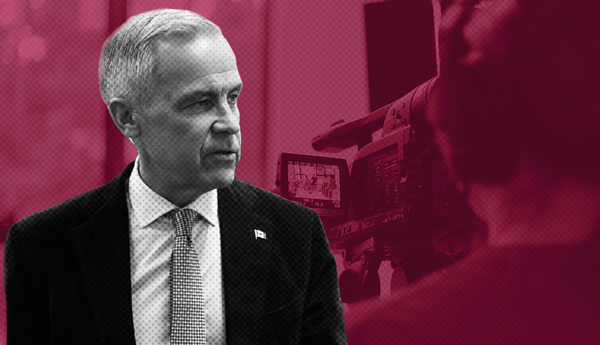There is probably no other billionaire in Canada who enjoys as much fawning media coverage as Jim Pattison.
The 94 year old is the namesake of a sprawling empire of businesses and investments ranging from supermarket chains, advertising billboards, media companies, car dealerships and export terminals (including a stake in a Vancouver coal port). The Jim Pattison Group was the second-largest privately held company in Canada as of January 2021. It has made Pattison himself extremely rich: According to Forbes, his net worth is currently 10.1 billion USD. Rather than enjoying his fortune in his old age, Pattison continues to work full time.
Pattison’s large economic footprint means that his name comes up often in news articles and broadcasts, particularly in Western Canada. But despite his immense power and some of his companies’ cruel policies toward workers in recent years, these stories are almost never directly critical. In fact, they regularly take the form of embarrassing puff pieces that praise his business acumen, ‘self-made man’ narrative and philanthropy.
The most recent one of these articles I could find was a piece in The Globe and Mail, written by Trevor Cole. It is among the most cringeworthy piles of dog shit I’ve ever read.
The piece, published on February 22, investigated a deeply probing question, with the headline reading: “Billionaire Jimmy Pattison is 94 and goes to work every day. What’s his secret?” In exploring this question, the article contained nuggets of wisdom like “back in the 1960s [...] [Pattison] was driven by unknown forces,” and, “His value as an example of what any Canadian with an insatiable appetite for business success can achieve […] might be immeasurable.”
The article then led into a transcript of a Zoom interview with the tycoon himself, and included questions such as, “Was there ever a time when your courage failed you?” “No,” Pattison replied — and with media coverage like this, who can be surprised by this answer? Later on in the interview, Pattison revealed that following his role as CEO of the Expo 86 fair in Vancouver, British Columbia’s then-governing right-wing Social Credit Party “offered [him] the job as premier.” Rather than dwelling on this eyebrow-raising piece of political history for too long, the interview meandered onto more important subjects, like Pattison’s childhood trumpet playing.
Cole is an accomplished novelist and journalist. No one at the Globe forced him to write this article, which is just one of several recent pieces about Pattison from other journalists that provide stiff competition for who can lick the billionaire’s boots most enthusiastically.
For example, last December, a CTV News article opened with the laughable suggestion that Pattison, whose name is literally scrawled across billboards all over Western Canada, “has little desire to maintain a high profile.” The piece then highlighted the “massive” cheques the billionaire regularly cuts for hospital foundations, which, the author assured readers, are “grateful for the cash.” The article included some other risible lines, such as “[Pattison] was characteristically humble about his contributions.” Although the article seemed to try its best to convince readers otherwise, it was not a paid advertorial.
In July 2021, the Financial Post ran a story headlined: “Who’s Jim Pattison? Empire builder and billionaire — just don’t call him ‘Canada’s Warren Buffett.’” Like all such pieces, it trod the tired path of retelling Pattison’s business hagiography and describing his busy work routine, before turning to the billionaire’s new interest in being “friendly to the environment.” As the article notes, Pattison made a large part of his fortune from industries with major greenhouse gas emissions, including in coal export terminals. But rather than dwell on this uncomfortable fact, the article, like the Globe piece mentioned above, moved hastily along to discuss Pattison’s musical hobbies in his boyhood.
These puff pieces represent only some of the most prominent examples of how Pattison is lauded in dominant media. I searched every mention of Jim Pattison by name (excluding those that only referred to his namesake companies and organizations, of which there are many) between February 2022 and February 2023 in the Canadian Newsstream database. Of the 23 articles that fit this criteria in the search, just one, a plucky editorial in the Prince George Citizen published on January 19, levelled any kind of direct criticism against Pattison. It concerned the Pattison-invested company Canfor, and its decision to cut 300 jobs at a pulp mill in Prince George.
The editorial made an admirable (if slightly naive) call to boycott Pattison’s businesses: “Why should the out-of-work employees give their severance cheques back to Pattison by shopping at the four Save-On-Foods stores in Prince George? Why should they listen to the two Pattison radio stations and watch the Pattison TV station? Seeing as Canfor is closing the Prince George pulp line to protect Pattison’s bottom line, it’s time for Prince George residents to show their dissatisfaction by protecting their own bottom line and hitting Pattison’s pocketbook.”
Every other article I could find in the archive during this year-long period, however, was either a dry account of Pattison’s business affairs, or a piece of glowing coverage of his career and charitable donations. In one such piece, former Jim Pattison Group president and COO Glen Clark (a trailblazer in the emerging B.C. NDP premier to corporate ghoul pipeline) told the Vancouver Sun that “Jimmy’s been a great mentor to me. [...] I would argue he’s the most successful business guy in our time, so you learn a lot.” In another piece, the Sun referred to Pattison as a “local business legend.”
Notwithstanding his highly publicized philanthropy, Pattison saw his wealth grow by $7.2 billion one year into the pandemic. His net worth is now close to $10 billion higher than at the pandemic’s onset in March 2020. In the summer of 2020, Pattison Group’s Save-On-Foods grocery chain clawed back its workers’ $2-per-hour hazard pay, while Pattison himself shamelessly boasted to local media that, “We’ve never been in better shape to invest. The question now is, where do we feel comfortable?”
This is part of a long history of Pattison’s companies’ poor treatment of workers. During the 1980s, his supermarket chains were staffed by large numbers of non-union and part-time workers. In 1993, Save-On-Foods management insisted that workers in Alberta accept pay cuts, and in 1996 the company locked out UFCW members so that it could pay new hires a lower starting wage. In 2008, Pattison’s Overwaitea company pressured unionized staff to work two-hour shifts, in a move the union’s communications representative called “shocking.” These are just a few examples.
And while one of Pattison’s hands writes sizeable cheques for hospital foundations (don’t forget that charitable donations also provide the rich with tax relief), his other hand has for decades made handsome donations to the very right-wing political parties that spent years gutting public health services and other social programs designed to help some of the most vulnerable. Ahead of the 2021 federal election, he vociferously spoke out against modest economic redistribution proposals, like a wealth tax, invoking the age-old threat of capital flight.
In the same interview, Pattison praised the Conservative Party and claimed that federal emergency support payments for workers during the COVID-19 pandemic “disincentivized people from returning to the workforce” (as the interviewer phrased it), a myth constantly invoked by bosses furious at an apparent uptick in workers’ bargaining power for better wages.
If Pattison was a politician, the credulous kind of reporting on him cited above would rightly never be tolerated by serious journalists and the broader public. And yet Pattison’s vast business empire, which reportedly employs more than 49,500 people, arguably has more direct control over the lives of its workers — not to mention the consumers with little choice but to buy essential goods from his oligopolistic corporations — than some politicians. His wealth, like that of all billionaires, is built on the backs of underpaid workers and squeezed consumers.
So why do so many in the media give this incredibly powerful man a virtual free pass? It’s possible that Pattison’s economic leverage and advertising dollars play some kind of pressuring role, but more fundamentally, it’s a sign that within dominant media, there’s a deeply embedded ideological assumption that accountability ought to be subject to different rules when it’s discussed in the context of the private sector.
Of course, these outlets do sometimes provide critical coverage of other billionaires and powerful business people. But the fact that they so readily and enthusiastically regurgitate Pattison’s trite, self-made philanthropist narrative, which is just as slick and carefully curated as any politician’s PR operation, while largely ignoring or glossing over his anti-worker views and actions, indicates a degree of credulity and/or capture that would never be taken seriously if applied to a public official.
Pattison is a true capitalist, and so no one should expect him to do anything other than hoard as much wealth as he can at the expense of his workers in his twilight years. But there’s no excuse for media outlets to give him such an easy ride. That Pattison will likely go to his grave in the next few years never again feeling serious heat from mainstream journalistic scrutiny is an embarrassment to the profession.







